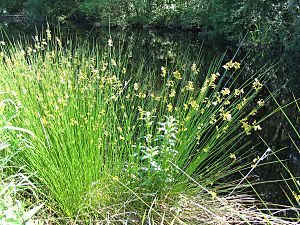Rush family facts for kids
Quick facts for kids Rush family |
|
|---|---|
 |
|
| Juncus effusus | |
| Scientific classification | |
| Kingdom: | |
| (unranked): | |
| (unranked): | |
| (unranked): | |
| Order: | |
| Family: |
Juncaceae
|
| Genera | |
|
|
The rush family (scientific name: Juncaceae) is a group of small plants. They often look a lot like grass. You can usually find them growing in wet, poor soil. There are about 400 different kinds, or species, of rushes. These species are grouped into eight main types, called genera. The most famous and largest type is called Juncus.
Rushes are a kind of flowering plant called a monocot. This means that when their seeds first sprout, they only have one tiny leaf.
Where Do Rushes Grow?
Rushes grow all over the world. They love wet places like marshes and swamps. This is because they prefer soil that is very moist.
Even if it gets very dry, young rush plants can survive. They can stay dormant, or "asleep," for a long time. Rush seeds can spread by water or by animals like birds. They can even stay dormant for up to 50 years during dry periods!
How Rushes Help
Rushes are an important food source for many animals. They also provide material for animals to make their beds or nests. Many birds and mammals use rushes for this purpose.
People have used rushes for a long time too. In the past, they were used for weaving mats, as medicine, and as food for animals. Today, some people still use them to make sleeping mats. However, they are mostly grown as decorative plants around ponds and water gardens.
See also
 In Spanish: Juncáceas para niños
In Spanish: Juncáceas para niños
 | Leon Lynch |
 | Milton P. Webster |
 | Ferdinand Smith |

